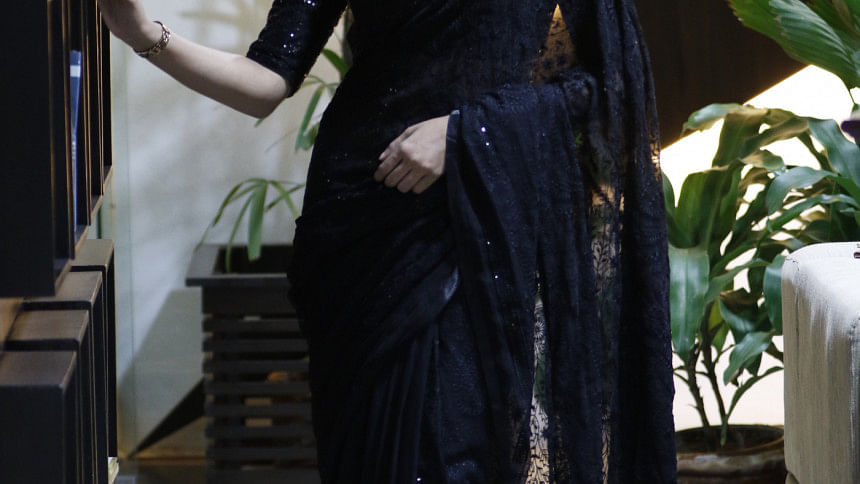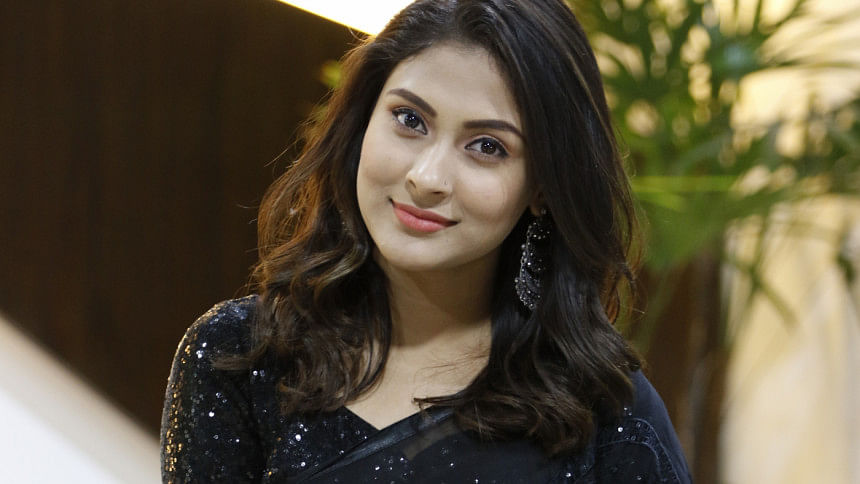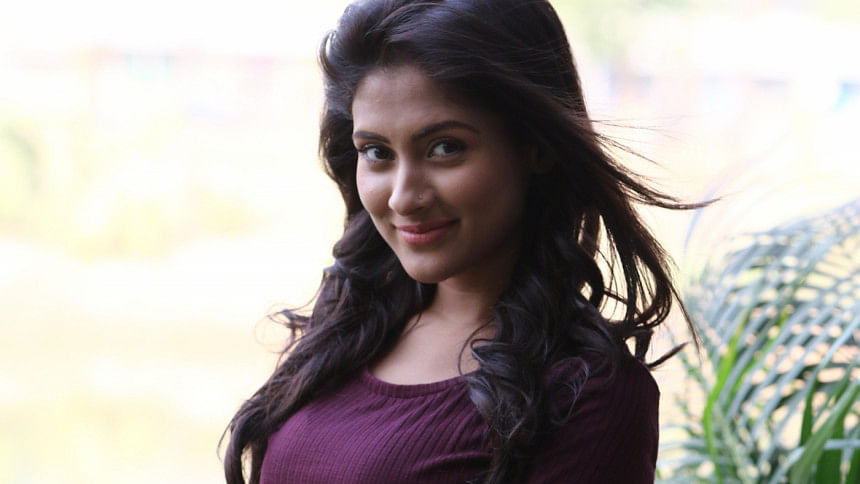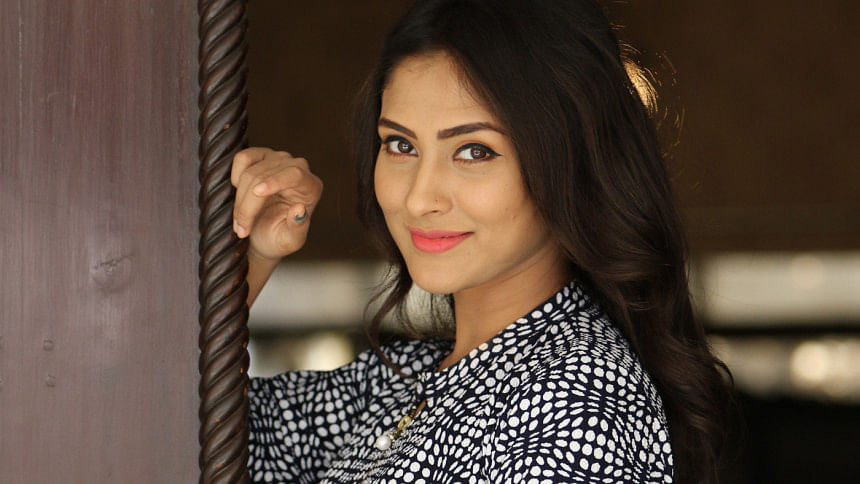Under the Spotlight
Rafi Hossain: Welcome to Uncensored with Rafi Hossain. Today, we're here with Mehzabien Chowdhury. Thank you for giving us your time.
Mehzabien Chowdhury: The pleasure is mine.
Rafi: If I'm not wrong, it seems to me that the people of your generation are not really interested in the Bangladeshi entertainment industry. You are an exception to this. Why do you think that is?
Mehzabien: Even when I was young, I always dreamed of seeing myself onscreen. I wanted to be in the limelight. Later in life, I participated in beauty pageants and had the chance to get involved with the showbiz industry. On the thought that people from my generation aren't interested in this industry, I would have to contradict you. I often get texts from people who want to get into acting, but don't have the chance to do it. I think if people were given more platforms, such as reality television shows, they would get the chance to showcase their talents.

Rafi: Most of the younger generation seems to be more interested in the western culture and media rather than our own. Do you agree?
Mehzabien: Since our childhood, we have been exposed to the western culture and it undoubtedly influences our preferences. People often say that there's a chance of a better future if one goes abroad. However, I would never do that as I love working in my own country. In the end, it all comes down to personal preferences. Moreover, before the rise of the popularity of social media, it was quite difficult to advertise. Nowadays, however, new websites and pages make it very easy and accessible to publicise and promote one's work. If someone has a good content or idea, they can present it to the audience easily through any of the various social media platforms. So, this also gives people incentives to be involved with the entertainment industry.
Rafi: Did you start acting immediately after leaving beauty pageants?
Mehzabien: Like I mentioned before, I always wanted to see myself onscreen. So, even when I was living abroad, I did a few photoshoots for local brands. This was back when I was a teenager, and that's when I first got involved with this industry.
Rafi: If one child in a family is associated with the entertainment industry, families tend to discourage the other children from joining hands. Why do you think that is?
Mehzabien: I can't speak for others, but my parents have always encouraged me to pursue my passion and be the best at what I do. I would give the same advice to my siblings. They can choose to follow the same career path as me, or do something entirely different. If they do choose to be a part of this industry, they would not need my help. If someone has the talent and the luck, there will always be a way to establish themselves.
Rafi: Why are you currently not interested in doing films?
Mehzabien: I don't want my first film to be similar to the kind of films that are being made presently. After working in this industry, I have realised that it is still very male-oriented. I want to be a part of films which give equal importance to the female lead.
Rafi: Even though it's the 21st century, many women are still hesitant and ambiguous about what they want. How did you manage to be this organised and planned?
Mehzabien: I think people need to have more confidence in themselves. Family support also plays a big role. I wouldn't be able to be here without the love and encouragement that my family showered me with. However, society has a tendency of dismissing women's thoughts and ideas, and often label them as bossy or arrogant for having their own opinions. But, if we look around, women are helping the country move forward; for instance, our prime minister. I think if people broadened their mindset and changed the way they view women, it would help us grow as a society.

Rafi: The '#MeToo' movement has gained a lot of popularity worldwide, and even women from the entertainment industry are speaking up about their experiences. Do you think this problem is prevalent in our showbiz industry as well?
Mehzabien: I think this problem is present in all industries. Women from every industry face these issues on a daily basis.
Rafi: How do you think this problem can be solved?
Mehzabien: I think the only way to deal with this is through speaking up. Women often avoid doing so as they are afraid of being subjected to victim-blaming. Currently, it's impossible for women to travel safely, even in broad daylight. We need to change that. We need to create a society where women feel safe to walk alone, even late at night.
Rafi: What do you think can be done to achieve this?
Mehzabien: I think that the perpetrators of such crimes should be punished according to the degree of their transgressions. In present times, we talk about current issues and crimes that are prevalent, but forget about it soon. But, we should not move on from such topics until justice is served.
Rafi: Do you ever want to take steps towards any social work to deal with such issues?
Mehzabien: I actually have a charity, called Hashi Foundation. We mostly deal with underprivileged children and women, and try to help them in any way we can.

Rafi: You have been in this industry for a long time now. Do you want to work as a director someday?
Mehzabien: Right now, I want to focus on my acting career. I want to achieve more things as an actor, and then I might think of working as a director. It's not on my mind currently as I believe there are already many great directors in the industry who deserve the opportunity.
Rafi: Do you think that it would be better if there were more women working behind the camera?
Mehzabien: It would give people the opportunity to see things from a different perspective. However, I think that the male directors focusing on such important causes are doing a good job as well. I am still unsure about why there are fewer women aspiring to be directors. One reason may be because directing is not yet viewed as a respectable profession in society.
Rafi: Do you consider yourself to be a feminist?
Mehzabien: I don't want to attach any labels to myself. I will always fight for what's right. I don't support any form of injustice, be it towards a man or a woman.
Rafi: There is a stereotype that women working in the film industry are often not intelligent. What do you have to say to that?
Mehzabien: Like I said before, I believe that the society should broaden their mindsets. Only then can people appreciate the hard work and effort that goes into becoming an actor. Most people still don't understand the impact such actors have on the society. I personally have utmost respect for people working in the entertainment industry. In Hollywood, actors take part in only a few films in their lifetime. In Bangladesh, however, actors work on hundreds of dramas and play many different roles. So, I believe that they are worthy of respect.

Rafi: Do you think the number of projects define the worth of an actor?
Mehzabien: I would not say that. Most actors are likely to be recognised for a few of their most popular films. With the current state of the industry, I, myself, would be content being a part of one good project every year.
Rafi: What kind of response do you get from your fans?
Mehzabien: I always get constructive feedback from my fans. They boost my confidence and even provide suggestions. Their responses help me understand the demand of the audience and their likes and dislikes. I think it's crucial to adapt to changes in the industry as it will only help it grow.
Rafi: Do you have any future plan that you would like to share?
Mehzabien: I want to go with flow and take part in anything good that comes my way.
Rafi: Many female actors stop working after getting married. What do you plan to do?
Mehzabien: I can't predict the future, but I want to marry someone who respects my career and can adjust to my routine.
Rafi: Thank you for giving us your time, Mehzabien. We wish you the very best for your future endeavours.

 For all latest news, follow The Daily Star's Google News channel.
For all latest news, follow The Daily Star's Google News channel. 





Comments